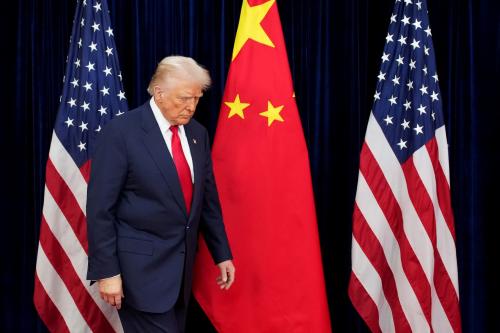Great power competition has returned. Or rather, it has reminded us that it was always lurking in the background. This is not a minor development in international affairs, but it need not mean the end of the world order as we know it.
The real impact of the return of great power competition will depend on how the United States responds to these changes. America needs to recognize its central role in maintaining the present liberal international order and muster the will to use its still formidable power and influence to support that order against its inevitable challengers.
Competition in international affairs is natural. Great powers by their very nature seek regional dominance and spheres of influence. They do so in the first instance because influence over others is what defines a great power. They are, as a rule, countries imbued with national pride and imperial ambition. But, living in a Hobbesian world of other great powers, they are also nervous about their security and seek defense-in-depth through the establishment of buffer states on their periphery.
Historically, great power wars often begin as arguments over buffer states where spheres of influence intersect—the Balkans before World War I, for instance, where the ambitions of Russia and Austria-Hungary clashed. But today’s great powers are rising in a very different international environment, largely because of the unique role the United States has played since the end of the Second World War. The United States has been not simply a regional power, but rather a regional power in every strategic region. It has served as the maintainer of regional balances in Europe, Asia, and the Middle East. The result has been that, in marked contrast to past eras, today’s great powers do not face fundamental threats to their physical security.
So, for example, Russia objectively has never enjoyed greater security in its history than it has since 1989. In the 20th century, Russia was invaded twice by Germany, and in the aftermath of the second war could plausibly claim to fear another invasion unless adequately protected. (France, after all, had the same fear.) In the 19th century, Russia was invaded by Napoleon, and before that Catherine the Great is supposed to have uttered that quintessentially Russian observation, “I have no way to defend my borders but to extend them.” Today that is not true. Russia faces no threat of invasion from the West. Who would launch such an invasion? Germany, Estonia, Ukraine? If Russia faces threats, they are from the south, in the form of militant Islamists, or from the east, in the form of a billion Chinese standing across the border from an empty Siberia. But for the first time in Russia’s long history, it does not face a strategic threat on its western flank.
Much the same can be said of China, which enjoys far greater security than it has at any time in the last three centuries. The American role in East Asia protects it from invasion by its historic adversary, Japan, while none of the other great powers around China’s periphery have the strength or desire now or in the foreseeable future to launch an attack on Chinese territory.
Therefore, neither Chinese nor Russians can claim that a sphere of influence is necessary for their defense. They may feel it necessary for their sense of pride. They may feel it is necessary as a way of restoring their wounded honor. They may seek an expanded sphere of influence to fulfill their ambition to become more formidable powers on the international stage. And they may have concerns that free, nations on their periphery may pass the liberal infection onto their own populaces and thus undermine their autocratic power.
The question for the United States, and its allies in Asia and Europe, is whether we should tolerate a return to sphere of influence behavior among regional powers that are not seeking security but are in search of status, powers that are acting less out of fear than out of ambition. This question, in the end, is not about idealism, our commitment to a “rules-based” international order, or our principled opposition to territorial aggression. Yes, there are important principles at stake: neighbors shouldn’t invade their neighbors to seize their territory. But before we get to issues of principle, we need to understand how such behavior affects the world in terms of basic stability
On that score, the historical record is very clear. To return to a world of spheres of influence—the world that existed prior to the era of American predominance—is to return to the great power conflicts of past centuries. Revisionist great powers are never satisfied. Their sphere of influence is never quite large enough to satisfy their pride or their expanding need for security. The “satiated” power that Bismarck spoke of is rare—even his Germany, in the end, could not be satiated. Of course, rising great powers always express some historical grievance. Every people, except perhaps for the fortunate Americans, have reason for resentment at ancient injustices, nurse grudges against old adversaries, seek to return to a glorious past that was stolen from them by military or political defeat. The world’s supply of grievances is inexhaustible.
These grievances, however, are rarely solved by minor border changes. Japan, the aggrieved “have-not” nation of the 1930s, did not satisfy itself by swallowing Manchuria in 1931. Germany, the aggrieved victim of Versailles, did not satisfy itself by bringing the Germans of the Sudetenland back into the fold. And, of course, Russia’s historical sphere of influence does not end in Ukraine. It begins in Ukraine. It extends to the Balts, to the Balkans, and to heart of Central Europe.
The tragic irony is that, in the process of carving out these spheres of influence, the ambitious rising powers invariably create the very threats they use to justify their actions. Japan did exactly that in the 30s. In the 1920s, following the Washington Naval Treaty, Japan was a relatively secure country that through a combination of ambition and paranoia launched itself on a quest for an expanded sphere of influence, thus inspiring the great power enmity that the Japanese had originally feared. One sees a similar dynamic in Russia’s behavior today. No one in the West was thinking about containing Russia until Russia made itself into a power that needed to be contained.
If history is any lesson, such behavior only ends when other great powers decide they have had enough. We know those moments as major power wars.
The best and easiest time to stop such a dynamic is at the beginning. If the United States wants to maintain a benevolent world order, it must not permit spheres of influence to serve as a pretext for aggression. The United States needs to make clear now—before things get out of hand—that this is not a world order that it will accept.
And we need to be clear what that response entails. Great powers of course compete across multiple spheres—economic, ideological, and political, as well as military. Competition in most spheres is necessary and even healthy. Within the liberal order, China can compete economically and successfully with the United States; Russia can thrive in the international economic order uphold by the liberal powers, even if it is not itself liberal.
But security competition is different. It is specifically because Russia could not compete with the West ideologically or economically that Putin resorted to military means. In so doing, he attacked the underlying security and stability at the core of the liberal order. The security situation undergirds everything—without it nothing else functions. Democracy and prosperity cannot flourish without security.
It remains true today as it has since the Second World War that only the United States has the capacity and the unique geographical advantages to provide this security. There is no stable balance of power in Europe or Asia without the United States. And while we can talk about soft power and smart power, they have been and always will be of limited value when confronting raw military power. Despite all of the loose talk of American decline, it is in the military realm where U.S. advantages remain clearest. Even in other great power’s backyards, the United States retains the capacity, along with its powerful allies, to deter challenges to the security order. But without a U.S. willingness to use military power to establish balance in far-flung regions of the world, the system will buckle under the unrestrained military competition of regional powers.
The Brookings Institution is committed to quality, independence, and impact.
We are supported by a diverse array of funders. In line with our values and policies, each Brookings publication represents the sole views of its author(s).




Commentary
The United States must resist a return to spheres of interest in the international system
February 19, 2015